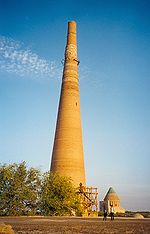
Il-Arslan
Encyclopedia

Atsiz
Atsïz was Khwarazm Shah from 1127 until his death. He was the son of Qutb ad-Din Muhammad.Atsïz gained his position following his father's death in 1127. During the early part of his reign he focused on securing Khwarazm against nomad attacks. In 1138 he rebelled against his suzerain, the Seljuk...
.
In 1152 Il-Arslan was made governor of Jand, an outpost on the Syr Darya
Syr Darya
The Syr Darya , also transliterated Syrdarya or Sirdaryo, is a river in Central Asia, sometimes known as the Jaxartes or Yaxartes from its Ancient Greek name . The Greek name is derived from Old Persian, Yakhsha Arta , a reference to the color of the river's water...
which had recently been reconquered, by his father. In 1156 Atsïz died and Il-Arslan succeeded him as Khwarazm-Shah. Like his father, he decided to pay tribute to both the Seljuk sultan Sanjar and the Qara Khitai gurkhan.
Sanjar died only a few months after Il-Arslan's ascension, causing Seljuk Khurasan
Greater Khorasan
Greater Khorasan or Ancient Khorasan is a historical region of Greater Iran mentioned in sources from Sassanid and Islamic eras which "frequently" had a denotation wider than current three provinces of Khorasan in Iran...
to descend into chaos. This allowed Il-Arslan to effectively break off Seljuk suzerainty, although he remained on friendly terms with Sanjar's successor, Mas'ud. They were alleged to have attempted to create a joint campaign against the Qara Khitai, but such an alliance never occurred. Like his father, Il-Arslan sought to expand his influence in Khurasan, and in the 1160s took an active interest in the area by supplying armies to local allies, but despite the collapse of central Seljuk authority in that area, he was unable to make any significant headway against the regional rulers.
In 1158 Il-Arslan became involved in the affairs of another Qara Khitai vassal state, the Karakhanids of Samarkand
Samarkand
Although a Persian-speaking region, it was not united politically with Iran most of the times between the disintegration of the Seleucid Empire and the Arab conquest . In the 6th century it was within the domain of the Turkic kingdom of the Göktürks.At the start of the 8th century Samarkand came...
. The Karakhanid Chaghrï Khan had been persecuting the Qarluks in his realm, and several Qarluk leaders fled to Khwarazm and sought Il-Arslan's help. He responded by invading the Karakhnid dominions, taking Bukhara
Bukhara
Bukhara , from the Soghdian βuxārak , is the capital of the Bukhara Province of Uzbekistan. The nation's fifth-largest city, it has a population of 263,400 . The region around Bukhara has been inhabited for at least five millennia, and the city has existed for half that time...
and besieging Samarkand, where Chaghrï Khan had taken refuge. The latter appealed to both the Turks of the Syr Darya
Syr Darya
The Syr Darya , also transliterated Syrdarya or Sirdaryo, is a river in Central Asia, sometimes known as the Jaxartes or Yaxartes from its Ancient Greek name . The Greek name is derived from Old Persian, Yakhsha Arta , a reference to the color of the river's water...
and the Qara Khitai, and the gurkhan sent an army, but its commander hesitated to enter into conflict with the Khwarazmis. In the end a peace was mediated where Chaghrï Khan was forced to take back the Qarluk leaders and restore them to their former positions.
In 1172 the Qara Khitai launched a punitive expedition
Punitive expedition
A punitive expedition is a military journey undertaken to punish a state or any group of persons outside the borders of the punishing state. It is usually undertaken in response to perceived disobedient or morally wrong behavior, but may be also be a covered revenge...
against Il-Arslan, who had not paid the required annual tribute. The shah collected his army but soon became sick and turned over his forces to one of his lieutenants. The Khwarazmi army was defeated, however, and Il-Arslan died shortly after. Following his death the state briefly became embroiled in turmoil, as the succession was disputed between his sons Tekish
Takash
Ala ad-Din Tekish or Tekesh or Takesh was Khwarazm Shah from 1172 until his death. He was the son of Il-Arslan. His rule was contested by his brother, Sultan Shah, who held a principality in Khorasan...
and Sultan Shah
Sultan Shah of Khwarezm
Sultan Shah was a claimant to the title of Khwarazm Shah from 1172 until his death. He was the son of Il-Arslan.In 1172 Il-Arslan died and his sons began fighting over who would succeed him. Sultan Shah was the younger son, but he was considered the formal heir and his mother, Terken Khatun,...
.

